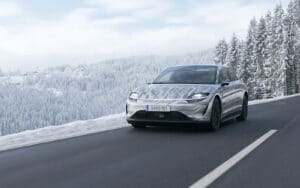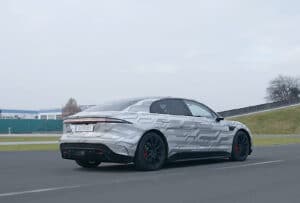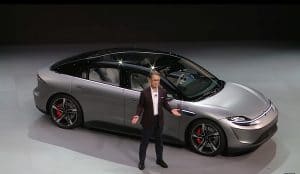
Sony created a big buzz during last year’s Consumer Electronics Show when it rolled out the Vision-S, a battery-electric prototype sedan its engineering team created from scratch, but only as a means of showing off its sensors and other auto-related technology, officials claimed.
That car, the company revealed at this year’s event, has been going through real-world testing in Austria for “technical evaluation,” officials noting it has “reached the next stage.” The car is designed to improve the driving experience by collecting data and applying it in real time.
“Currently we are looking to optimize safety through test drives on public roads,” said Kenichiro Yoshida, chairman, president and CEO of Sony Corp. during a presentation. While it is currently testing the vehicle in Europe, it will also conduct testing in other regions, the company noted.
(Sony displays its automotive vision with new EV concept car at CES.)

The news comes on the heels of recent revelations that Apple is looking to produce an electric vehicle with autonomous capabilities by 2024. The on-again, off-again Project Titan appears to be on again, this time with some help from Hyundai and Kia.
Hyundai officials confirmed recently that they’ve been talking with a “tech company,” suggesting it was Apple. The issues the two sides are working out include where to build an “iCar.” The initial thought was to build it at Kia’s U.S. plant in West Point, Georgia, however, a new, ground-up site remains a possibility.
As for the Vision-S, it’s still a bit of a mystery, although a few more details have become available. Since it was initially created as an exercise in sensor development, the company now claims it uses 40, whereas the number was a 33 when it rolled out last year.
(Nio ET7 could be first EV with solid-state battery — and over 600-mile range.)
Weighing at 5,180 pounds, it’s powered by a pair of 268-horsepower (200-kilowatt) electric motors – one on each axle – resulting a 0 to 62 mph in just 4.8 seconds with a top speed of 149 mph. It’s also capable of a variety of autonomous functions, such as parking.

The company still remains tight-lipped about the vehicle’s long-term potential as a new business for the electronics giant, but officials at Magna Steyr, which has a long history of building specialty cars for automakers, which has transferred over electric vehicles, suggest more could be in the works.
Frank Klein, the president of Magna Steyr, described the Vision-S as “just the starting point of our joint cooperation.” The company is already committed to building vehicles for Fisker Inc., starting with the Ocean crossover in 2022.
(Apple and Hyundai reportedly talking about possible collaboration on an iCar.)
A move by Sony into the EV arena, given all of the new players, such as the aforementioned Apple, Fisker, plus startups like Rivian and Lucid and legacy automakers General Motors, Ford and more, would require a massive amount of cash and other resources.







